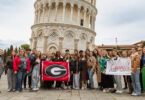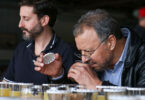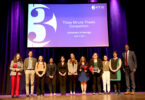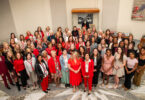Athens, Ga. – The University of Georgia Honors Program is currently accepting applications from UGA undergraduate researchers who would like the opportunity to present their original research and creative works at the 2008 Center for Undergraduate Research Opportunities (CURO) spring symposium. The event will be held on March 31 at the Classic Center in downtown Athens.
“The CURO symposium has become the academic highlight for undergraduates at the University of Georgia,” said Pamela Kleiber, associate director of the Honors Program. “We are fortunate that faculty from virtually every department, school and college at the university encourage their strongest and most experienced students to present their work at the symposium and also encourage their younger students to attend so they are inspired to take their turn in subsequent years. Faculty appreciate the importance of their students sharing their findings in the larger context of a university-wide symposium. We expect to top 200 undergraduate presentations this year.”
Open to UGA undergraduates with a 3.4 minimum grade point average who engage in original, faculty-guided research endeavors in any discipline, the CURO symposium provides the forum in which students can showcase their creative and scholarly efforts to a larger audience.
For example, Lauren Kelly, a junior microbiology and Spanish double major at UGA, has been intrigued with conducting research since her freshman year when she studied the flight patterns of an Asian tiger mosquito and gave a presentation at UGA’s Molecular Parasitology/Vector Biology symposium. With that first exposure to hands-on research, Kelly is now delving into more life-threatening infectious diseases issues, working under the guidance of Julie Moore, a professor of infectious diseases and a member of UGA’s Center for Tropical and Emerging Global Diseases.
“Conducting scientific research as an undergraduate has expanded my mind and each day challenges me to think critically and analyze ideas, methods and information,” said Kelly. “I believe every undergraduate student should be exposed to the stimulating environment of research. It bolsters continual learning and serves as a venue to harvest passions and to challenge oneself as an individual.”
Kelly is one of a growing number of students pursuing research endeavors at the undergraduate level either through CURO or other research programs at UGA. The annual undergraduate research symposium is the cornerstone of CURO.
“The CURO symposium is often the first but seldom the last research presentation our students share. Many of these students go on to present at state, regional, national and, in some cases, international venues,” said David S. Williams, director of the Honors Program. “The CURO symposium is valuable because students from all fields learn to discuss their research with experts and also with people who have only a lay person’s knowledge of the content area. It is critically important for students to learn to communicate the significance of their research to various audiences.”
Erica Holland, a sophomore public relations and speech communication major, had the opportunity to experience the CURO symposium as a high school senior when she was recognized as a CURO Promising Scholar and invited to the event. That visit sparked her interest in undergraduate research and led to her involvement with the CURO Apprentice Program where she received the Donald and Louise Hollowell Apprenticeship.
“I have learned so much about myself-my research interests and career interests-and I have definitely grown as a person through my research at UGA,” said Holland, who is studying the history of the “n-word” and the implications of how it is used on a predominately white college campus with faculty mentor and history professor Robert Pratt.
“When you’re doing research in a non-science area, it’s a bit more challenging to come up with project ideas,” she added, “but it’s definitely rewarding because you make up your own lab, set your own guidelines, and from there, the sky’s the limit.”
UGA students interested in presenting at the 2008 CURO symposium must submit an application, an abstract of no more than 250 words describing the research project, and a supporting letter from the sponsoring faculty member via the CURO web site, www.uga.edu/honors/curo, no later than Jan. 18. All applicants will be notified by mid-Feb.







